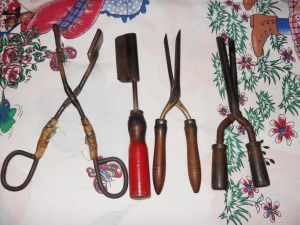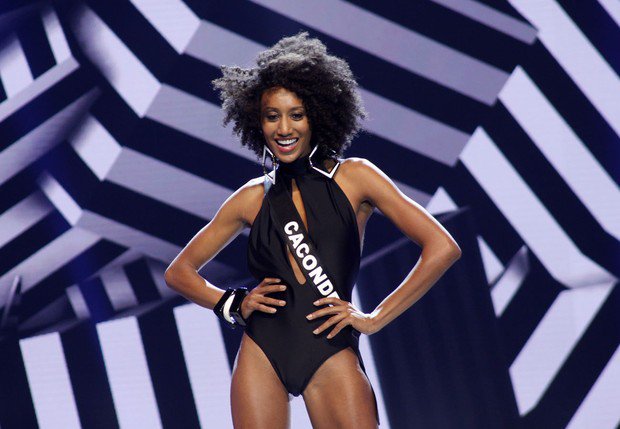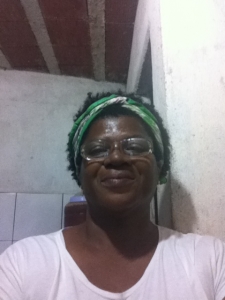by Adelimar da Conceição
Click here for Portuguese version
Everything started when my grandma called me to brush my hair, which was really voluminous and curly. I still remember how reluctant I was to brushing it when I was 5 years old.
Blows on the head, pinches and punishment… Crying was not permitted, nor was any movement to avoid the brush and prevent it from penetrating my hair. The hardest part, for sure, was not my curly hair, but rather listening to this sentence: “no one here has such hard hairs like yours! It looks more like a barbed wire”. This is how she had been taught.
When I started going to school, I experienced vexing moments of intense and systematic discrimination, which can be described as purgatory. I received an extensive list of pejorative names going from mop face, witch hair, Bombril (the name of a cleaning product), big lips, or monkey, among others that are not worth mentioning here.
On top of these insults, us girls also suffered from physical aggressions, much more than boys. As a child, I could already see the difference. In the end, whether black or white, poor or rich, women all received the same patriarchal instruction at home: “we are weaker”. Black girls were always despised when looking for a partner, for instance in dancing circles, or to be princess or angel in school plays; “princesses and angels are not black!”. What an injustice! But if I suffered physical and symbolic aggressions, school is also the place where I’ve learned how to defend myself.
I have been badly treated by people of my age, some had similar financial conditions, some were better off, but they all shared something; intolerance and hatred. I agree with Nelson Mandela when he says: “No one is born hating another person because of the colour of his skin, or his background, or his religion. People must learn to hate, and if they can learn to hate, they can be taught to love, for love comes more naturally to the human heart than its opposite.”
I remember vividly our school books and teachers’ discourses back in the 1970s and 1980s, right in the middle of the military regime in Brazil. When they would, by chance, touch upon the question of slavery, it was always like that: princess Isabel is our hero (of us blacks), and my people passively accepted slavery for centuries. They would also romanticize rapes perpetrated by white masters against their black women slaves (Saffioti, 1969). Those were the lies we had been taught at school – historical pitfalls which construct and feed racism, prejudice and violence. One of the current expression of this multifaceted racist system is the genocide of our black youth in Brazil. Culture of superiority and hatred… how could we have deconstructed that to teach people love instead of hate in the context of the 1970-80s?

Image credits: Negra Rosa: Cabelos!
When a teenager, I had already internalised that my hair and my skin colour were bad, and had already developed a complete aversion to my hair. This lie, which hides and feeds racism, had been repeated over and over again so much as to replace the truth. At this time of my life, I was using a lot of hot comb and hennas, famous for having only temporary effect; they are comparable to the straightening iron vs. rain dilemma. With the arrival of new techniques on the market, they lost their clientele to the benefit of straightening products made with caustic soda which is extremely aggressive for the scalp. I have tried numerous brands of smoothing products, irons and brushings; all used in order to come closer to the hegemonic white beauty canon. Straight hair on a black body, what an contradiction!
Time goes by but all these years lived under the myth of racial democracy in Brazil have let their dark and tenebrous marks on my self-esteem. At the age of 55, I am finally studying pedagogy at the Universidade Federal Fluminense (UFF – state university in Rio). Throughout this ongoing academic journey, I joined a research group called “Black men and women in Movement”, which aim is to train teachers to apply the Law 10639/03 in their classrooms. This law, signed by the then President Luís Inácio Lula da Silva, stipulates that history curriculum in public schools must contain a module on Afro-Brazilian culture in its political, historical, social and cultural aspects.
Since I entered this space, new feelings flourished in me; perplexity, belonging, pride and equality. Perplexity of finding out that black people had a history of struggle and resistance, that we have a rich culture, with kings and queens in our ancestral Africa. How many erasures had been made under white domination, which only agrees to show us poverty in the African continent, often omitting to say that poverty is a result of spoliation, robbery and abuses imposed by the old continent who tries at any rate to keep its privileges intact.
Knowing about this history has lit the fire of resistance inside me, how could I have fought before without having the knowledge? Knowing is the measure of belonging. Then, I started feeling proud of my body and its phenotypical legacy; nose, black skin and hair, this beautiful triad highlights my pleasure of being and self-defining as black.
While I was going to school, I learned about European culture and history, Egyptian culture was almost never mentioned, and when it was, no one would say that Egypt belongs to the African continent. Equality can only be achieved when nobody will be denied the right to know their own history; this is the basis of our citizenship and identity.
From the moment I left the obscurantism of the cavern, I saw the light of empowerment; and every day I long for being black, now that I have broken with the old paradigms that had once kept me in the dark. Inspired by the power of knowing, I wanted to take this knowledge to young girls and boys from the lower classes of our society. We remain without representation on TV or other media, and our bodies do not fit in beauty canons. However, I did notice a small difference when I went back to school as a trainee teacher from the UFF.
This liberation process is now expressed through my hair and physical appearance; I no longer use any chemical products and let my hair completely natural, as a way of affirming my identity. In the classroom, when asked by students about my curly hair, I answered with a citizenship lesson. Indeed, I now challenge this so-called “hard hair” myth which had made me suffer so much in the past. In the school where I did my internship for 6 months, I discussed with my students the subtle forms that racism and discrimination can take today. We had debates, songs and poetry. My attitude towards my hair reverberated on some of them.
Paula stopped using chemicals, her hair was damaged and her scalp injured, and Manoela abandoned her braiding – which were not adequately cared for and as a consequence was damaging her hair – for a more natural cut. By the time I finished the internship, I realised they were already used to their new looks, and were even sharing tips for curly hair. A few years ago, we didn’t have the information or products to brush and take care of our curly hair, but nowadays the cosmetic industry is investing like never before in ethnic products. We even have famous bloggers disseminating information to assist us with the care of our curls.
The best thing for me is that these two students actually loved their natural hair and would defend it, using arguments against prejudice and discrimination. This was the most engaging experience I had. If racism had made me despise my own hair, information and studies about the African diaspora redeemed my self-esteem. I know the process of consciousness raising for Brazilians of African descent and the fight for their citizenship and identity is only beginning, but I see this journey with a lot of hope. Indeed, on the 29th of May 2016, the first ever state black miss was elected; black skin and natural curly hair so big it could touch the sky. Genuinely black, with no disguise. Paradigm beaten in São Paulo, the richest and most prosperous state of Brazil!

Image credits: Geledés
Translated from Portuguese by Louisa Acciari
————————————
Portuguese version
Tudo começou quando minha avó chamava-me para pentear o cabelo que era muito volumoso e crespo. Momento de muito choro. Lembro como relutava para que não fosse penteado, isso por volta dos meus cinco anos.
Cascudos, beliscões e direito a punição; não era permitido choro nem movimentações na tentativa de esquivar do pente, de modo a não permitir que penetrasse em meus fios. O mais duro com certeza não eram meus cabelos mais sim ouvir a seguinte frase: “Aqui ninguém tem um cabelo tão duro quinem o teu, parece mais um arame farpado”. Ela aprendeu assim também.
Quando ingressei na escola, vivi momentos vexatórios de discriminação intensa e sistemática, posso descrevê-los como o verdadeiro purgatório. Comecei a receber apelidos pejorativos numa lista grandiosa e extensa que vai do cabelo de piaçava, cabelo de bruxa, Bombril, beiçuda, macaca… entre outros que não valem a pena aqui serem mencionados.
Além dos insultos verbais e não verbais incluíam-se as agressões físicas, mais sobre as meninas do que sobre os meninos. Mesmo sendo criança percebia a diferença. Afinal das contas, sejam elas negras ou brancas, pobres ou ricas, as mulheres recebem a orientação familiar patriarcal para submissão: “somos mais fracas”. Nós negras, éramos sempre preteridas na busca de um par, por exemplo: dançar quadrilha, ser princesa ou anjo em peças de teatro na escola nem pensar, por que “princesas e anjos não são negros”, quanta injúria! Se na escola recebi as maiores agressões físicas e simbólicas, foi também lá que aprendi a usar meus braços para me defender.
Fui muito hostilizada na escola por pessoas da mesma idade que eu, uns com condições financeiras idênticas, outras em condições mais favoráveis, porém ambos os grupos partilhavam de algo em comum, a intolerância e o ódio. Concordo com Nelson Mandela quando ele afirma o seguinte: “Ninguém nasce odiando outra pessoa pela cor de sua pele, ou por sua origem, ou sua religião. Para odiar, as pessoas precisam aprender, e se elas aprendem a odiar, podem ser ensinadas a amar, pois o amor chega mais naturalmente ao coração humano do que o seu oposto. A bondade humana é uma chama que pode ser oculta, jamais extinta”.
Lembro muito bem dos livros didáticos e também do discurso dos professores, naquele contexto escolar dos anos 70 e 80 em pleno golpe militar. Quando por um acaso abordassem o tema da escravidão era sempre assim: que princesa Isabel foi nossa heroína (dos pretos), e que meu povo aceitou passivamente a escravidão. Também romantizavam os estupros cometidos pelos senhores contra as negras africanas escravizadas (Saffioti, 1969). Essas foram as mentiras que foram ensinadas a mim e aos meus colegas de escola, armadilhas históricas, que construíram e alimentam o racismo, preconceito e a violência que tem como uma das suas múltiplas facetas o genocídio da juventude negra atualmente. Cultura da superioridade ao ódio, como desconstruí-la para ensinar a amar a todos nesta perspectiva do ensino dos anos 70-80?
Na adolescência já havia eternizado que meu cabelo e minha cor eram ruim mesmo, já havia desenvolvido completa aversão aos meus cabelos, afinal escutar por repetidas vezes essa mentira tomou o lugar da verdade que se esconde e apoia o racismo. Nesta fase da vida fazia uso do pente quente e os henês, conhecidos produtos de transformação de eficácia temporal; iguala-se ao contratempo chapinha versus chuva. Com a chegada de novas técnicas eles perderam seu espaço no mercado para os alisamentos à base de Soda Cáustica que é nocivo ao couro cabeludo. Conheci inúmeras marcas de alisantes, permanentes, chapinhas e escovas; expedientes usados para aproximação do padrão de beleza estética hegemônica branca. Cabelo liso na pele negra, que grande incoerência!
O tempo passa mas os anos vividos sob a falsa ideologia da democracia racial, que afirma que no Brasil não há existência de racismo, deixam seus rastros tenebrosos e sombrios na autoestima. Finalmente aos cinqüenta e cinco anos estou cursando pedagogia na Universidade Federal Fluminense (UFF). Ao longo dessa jornada acadêmica em curso, associei-me ao grupo de Pesquisa e Extensão denominada “Negra e Negra em Movimento”, que tem como objetivo a capacitação de professores para compreenderem a Lei 10639/03 assinada pelo então presidente Luís Inácio Lula da Silva, que determina o ensino de História da África e Cultura Afro-brasileira, em seus aspectos políticos, históricos, sociais e culturais.
Desde que adentrei naquele espaço, novos sentimentos afloraram dentro de mim; perplexidade, pertencimento, orgulho e igualdade. Perplexidade por descobrir que o povo negro tem história de resistência e muita luta, povo de riquíssima cultura e que havia reis e rainhas na ancestralidade africana. Quanto apagamento promovido pela supremacia dominante branca, que nos mostra somente a pobreza do continente africano e omite que esta pobreza é devida à espoliação, saque e o abuso do qual sofreram e sofrem até hoje do velho mundo que a custa de sangue prioriza manter seus privilégios.
Através do acesso à história acende o fogo da resistência e da luta, porque como lutaria se não conheço? Conhecer é a medida do pertencimento. Em seguida veio morar nas minhas entranhas o orgulho de trazer meu corpo a herança fenotípica dos ancestrais; nariz, pele negra e cabelo, essa tríade maravilhosa evidencia o prazer de me reconhecer e me tornar negra.
Durante todo tempo ido na escola, aprendi a história e cultura Europeias, raras vezes a civilização Egípcia foi comentada, jamais citavam que o Egito pertence ao Continente africano. A igualdade é percebida quando a nenhum homem for negado o direito a conhecer sua história, fator primordial para cidadania e identidade.
Do momento da saída da caverna do obscurecimento me veio à luz do empoderamento, e a cada dia o desejo de tornar-me negra uma vez que já havia quebrado paradigmas que outrora me haviam acorrentado na penumbra da sombra da caverna. E, inspirada neste poder que o conhecimento nos concede, queria levar esse entendimento à meninas e meninos da base mais baixa da pirâmide social. Continuamos sem representatividade na televisão e também em outras mídias, nosso estereótipo não se enquadra nos padrões beleza. Porém, percebi ainda que timidamente uma pequena mudança quando retornei à escola, na condição de estagiária da UFF.
O processo libertário também chegou aos meus cabelos pela forma pela qual hoje o trato a zero química, totalmente natural, hoje o uso desta forma como bandeira de resistência e afirmação. Em sala de aula, quando questionada pelas crianças sobre esses meus cabelos crespos, rendem aula de cidadania; pois desmistifico a tal fala do cabelo duro, que tanto me causou dor no passado. Na escola que fiquei como estagiária por seis meses, estudei com eles formas sutis de preconceito e discriminação; rendeu debates, músicas e até poesia.
Minha conduta em relação ao meu cabelo reverberou: a aluna Paula parou de usar química – seus cabelos estavam visivelmente danificados e com feridas no couro cabeludo, e a Manoela abandonou as tranças que pela falta de higiene adequada estragavam seu cabelo. Quando terminou o meu estágio, percebi que ambas já haviam se adaptado ao seu novo visual, trocavam até receitinhas e dicas de penteado para cabelos crespos. Há alguns anos não tínhamos as informações nem produtos para tornar mais fáceis o manuseio e cuidado; mas hoje em dia, a indústria cosmética investe como nunca no nosso seguimento étnico. Até famosas blogueiras na internet fomentam e disseminam informações atualizadas que auxiliam nos cuidados com os cachos.
O melhor era que essas duas alunas amavam seus cabelos naturais e os defendiam calcadas em tudo que aprenderam sobre discriminação e preconceito, foram as experiências mais envolventes que obtive. Se antes o racismo trouxe aversão aos meus cabelos, hoje a informação e o estudo sobre a diáspora africana resgatou a autoestima. Sei que a conscientização dos afrodescendentes brasileiros na luta pelo resgate da sua cidadania e identidade só está no começo da caminhada, mais vejo com grande esperança. Pois dia 29 de maio 2016 foi eleita a primeira miss estadual negra, de pele negra e cabelos naturais querendo acariciar o céu, genuinamente negra sem disfarces. Paradigma vencida em São Paulo, o estado mais rico e próspero do Brasil!
Adelimar da Conceição has worked most of her life as a domestic worker in Rio de Janeiro. At the age of 50, she started a graduate degree in Pedagogy with a scholarship from Capes, at the Universidade Federal Fluminense (UFF). She is currently writing her dissertation on the Experimental Black Theatre in Rio in the 1940s. She also works as a volunteer in the outreach project of adult learning for sub-contracted cleaners on her campus (Projeto de Extensão EJA-UFF limpeza total).



Um relato muito emocionante. Na história pessoal de Adelimar Conceição, a história da opressão racial brasileira. E de tantas outras formas de opressão, como de gênero e de classe. Ao mesmo tempo, a história da luta pessoal e coletiva contra estas mesmas opressões. Por mais igualdade, por mais justiça e por mais amor, sigamos!
Ao iniciar a leitura desse Artigo já comecei a me emocionar. Meus filhos são negros, um menino e uma menina. Ambos tem o cabelo afro. Quero dizer que já passei por muitos momentos constrangedores por conta disso. E em nenhum momento permiti que meus filhos fossem menosprezados por conta do cabelo ou cor. Ensinei a eles a terem orgulho de suas origens e hoje tenho o prazer de vivenciar isso. Nos momentos de lazer, na escola (minha filha), na faculdade (meu filho) e em todos os aspectos.